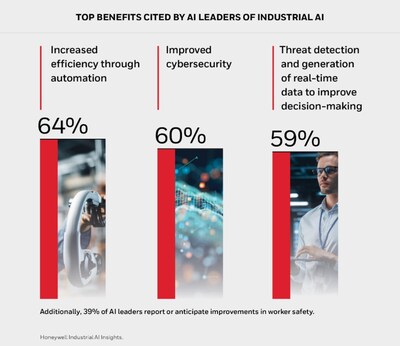INDUSTRIAL AI UPTAKE IS JUST GETTING STARTED BUT MAJORITY OF SECTOR IS UNCOVERING NEW USE CASES, FINDS HONEYWELL RESEARCH
Rhea-AI Summary
Honeywell's Industrial AI Insights global research study reveals that AI adoption in the industrial sector is just beginning, with only 17% of AI decision-makers having fully implemented their initial plans. However, 94% of those surveyed plan to expand their AI utilization, indicating strong enthusiasm for the technology. The study highlights key benefits of AI in industrials, including:
- Efficiency and productivity gains (64%)
- Improved cybersecurity and threat detection (60%)
- Better decision-making through real-time data (59%)
- Increased work flexibility (49%)
- Greater job satisfaction (45%)
AI is seen as a solution to address the industrial skills shortage by enabling faster upskilling and reskilling of workers. Despite challenges such as C-Suite understanding and resource justification, the pace of AI adoption is expected to increase as new solutions demonstrate clear benefits to workforce productivity, safety, and reliability.
Positive
- 94% of surveyed AI leaders plan to expand their AI utilization
- 64% of respondents cite efficiency and productivity gains as a key benefit of AI
- 60% report improved cybersecurity and threat detection from AI implementation
- AI is seen as a solution to address the industrial skills shortage
- AI enables faster upskilling and reskilling of workers
Negative
- Only 17% of AI decision-makers have fully implemented their initial AI plans
- 37% feel that their C-Suite doesn't fully understand how AI works
- 48% say they are having to continually justify or request resources for AI implementation
News Market Reaction 1 Alert
On the day this news was published, HON gained 0.19%, reflecting a mild positive market reaction.
Data tracked by StockTitan Argus on the day of publication.
Workforce productivity, flexibility, and safety are cited as key gains from AI applications along with its potential to address the industrial skills shortage
CHARLOTTE, N.C., July 23, 2024 /PRNewswire/ -- Honeywell (Nasdaq: HON) today released the findings of its Industrial AI Insights global research study, which captures the state of Artificial Intelligence (AI) in the sector. While only
The research also finds AI leaders are "sold" on AI for industrial applications. The enthusiasm for a deeper commitment to AI investment is nearly universal, with
"There is no question that AI is currently at a pivotal moment," said Kevin Dehoff, Honeywell's Chief Strategy Officer. "With the advent of Gen AI and more sources of data from advanced analytics, Industrial AI is poised to grow exponentially, and the possibilities are endless for revenue growth and employee satisfaction."
AI Unlocks Workplace Benefits
When asked for their thoughts on the impact of AI on industrials, nearly two-thirds (
Several other benefits of AI for workers were also cited by respondents, including:
- Increased work flexibility (
49% ) - Greater job satisfaction (
45% ) - More time for skills development and creative thinking (
44% ) - Increased workplace safety (
39% )
Skills development is crucial in today's economy with baby boomers retiring and fewer replacements entering the workforce. Through AI, employers can more quickly upskill and reskill workers. AI will transform industrials as it enables workers to perform jobs at higher levels, providing greater job satisfaction while increasing productivity and addressing the skills shortage.
Lucian Boldea, President and CEO of Honeywell Industrial Automation, offered one direct example: "There can be tens of thousands of instruments, equipment, and valves needed to process and manufacture a product and many of the parts we supply manufacturers require highly experienced technicians for operation and maintenance – and there are fewer and fewer of those experienced technicians available. With AI training and AI as a "co-pilot" the skills of a less experienced technicians can more quickly be upgraded, turning them into more elite experts that perform tasks based on enterprise knowledge and best practices. In turn, plants' operations can run more safely and reliably by dramatically reducing human error."
What's Next for AI
While the enthusiasm for AI to expand is palpable, there are still some challenges in the way of full adoption. More than a third of survey respondents (
"Businesses of all types recognize that AI is transforming our world and creating new possibilities. For building operations – such as hospitals, campuses, and offices – it is clearly the future. As AI orchestrates controls that regulate HVAC, lighting and electricity usage, it helps to improve safety, operational and sustainability outcomes," said Billal Hammoud, President and CEO of Honeywell Building Automation.
All of this suggests the pace of change will be driven by compelling use cases that can be measured in terms of improved business performance. As new solutions demonstrate clear benefits to workforce productivity, safety, and reliability, AI adoption will dramatically increase with the potential to transform industrial operations.
To learn more about the survey results and Honeywell's work in AI and automation, please visit www.honeywell.com/us/en/ai/research.
Methodology
Honeywell commissioned Wakefield Research to survey AI leaders around the world. The online survey, which was conducted from April 22 through May 2, 2024, involved 1,600 executives in 12 global markets (US,
About Honeywell
Honeywell is an integrated operating company serving a broad range of industries and geographies around the world. Our business is aligned with three powerful megatrends – automation, the future of aviation and energy transition – underpinned by our Honeywell Accelerator operating system and Honeywell Forge IoT platform. As a trusted partner, we help organizations solve the world's toughest, most complex challenges, providing actionable solutions and innovations through our Aerospace Technologies, Industrial Automation, Building Automation and Energy and Sustainability Solutions business segments that help make the world smarter, safer and more sustainable. For more news and information on Honeywell, please visit www.honeywell.com/newsroom.
Media Contacts:
Mary-Ellen Harn
+1 (704) 816-0713
MaryEllen.Harn@honeywell.com
Dawn Wotapka
+1 (631) 943-3782
Dawn.Wotapka@Honeywell.com
![]() View original content to download multimedia:https://www.prnewswire.com/news-releases/industrial-ai-uptake-is-just-getting-started-but-majority-of-sector-is-uncovering-new-use-cases-finds-honeywell-research-302203180.html
View original content to download multimedia:https://www.prnewswire.com/news-releases/industrial-ai-uptake-is-just-getting-started-but-majority-of-sector-is-uncovering-new-use-cases-finds-honeywell-research-302203180.html
SOURCE Honeywell









